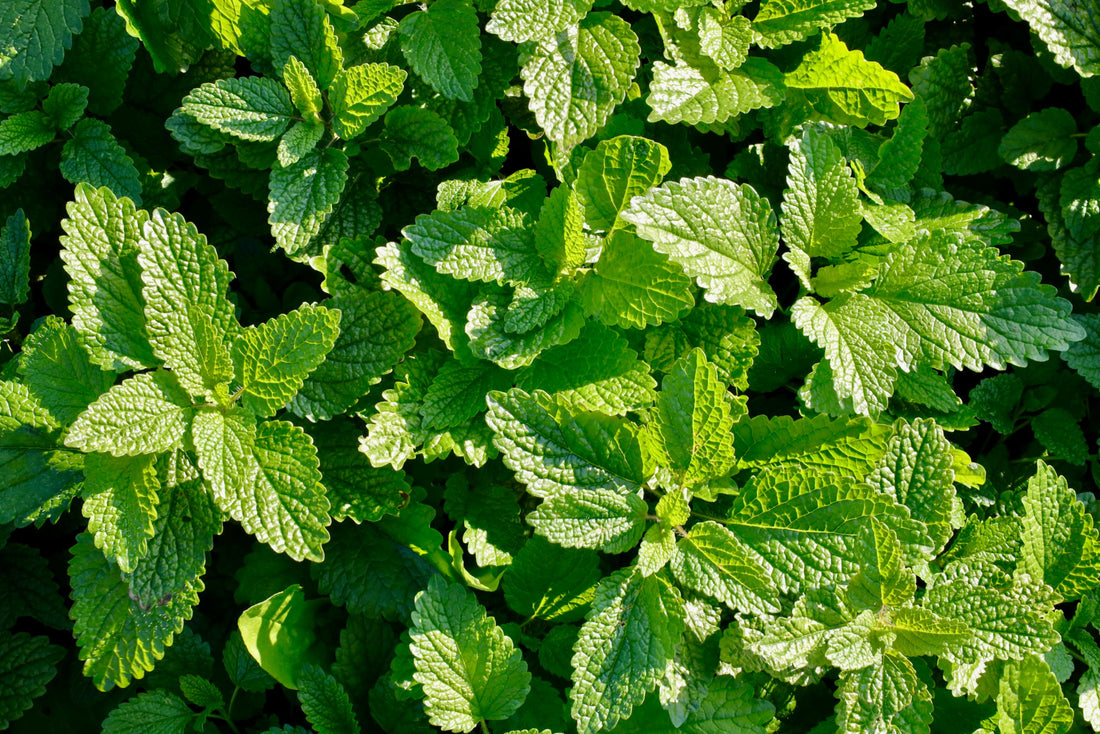
Lemon Balm (Melissa officinalis): Comprehensive Herbal Monograph and Wellness Guide
Lemon balm (Melissa officinalis) is a fragrant, lemon-scented herb from the mint family prized for its calming and antiviral properties. This comprehensive monograph explores lemon balm’s botanical identity, phytochemistry, traditional and modern uses, clinical research, safety profile, and practical applications.
Botanical Identification and Plant Description
-
Scientific Name: Melissa officinalis L.
-
Family: Lamiaceae (Mint family)
-
Common Names: Lemon balm, balm, balm mint, sweet balm
-
Plant Description: A perennial herbaceous plant growing 1-2 feet tall, with ovate, bright green leaves that emit a mild lemon scent when crushed. It produces small, white to pale yellow flowers in summer.
For more about the flavor profile of lemon balm and other herbs grown on our farm see our article here.
Phytochemistry: Active Constituents
Lemon balm contains a variety of bioactive compounds including:
-
Essential oils: Citral, citronellal, geraniol, and linalool – responsible for the lemon aroma and many therapeutic effects.
-
Phenolic acids: Rosmarinic acid, caffeic acid – potent antioxidants with anti-inflammatory and antiviral activities.
-
Flavonoids: Luteolin, quercetin – antioxidants supporting immune health.
-
Tannins and triterpenes contribute to astringent and anti-inflammatory effects.
Traditional and Historical Uses
Lemon balm has a long history in traditional European and Mediterranean herbal medicine, including:
-
Calming the nervous system to reduce anxiety and stress
-
Promoting restful sleep and relaxation
-
Soothing digestive disturbances like indigestion and gas
-
Treating cold sores and other viral infections topically
-
Uplifting mood and mental clarity
Monks and herbalists prized lemon balm as a “heart herb” that nurtured both body and mind.
Pharmacological Actions and Clinical Evidence
Research supports several key pharmacological effects of lemon balm:
-
Anxiolytic and Sedative
Enhances GABA (gamma-aminobutyric acid) activity in the brain, promoting calm and reducing anxiety symptoms.
-
Antiviral
Exhibits activity against herpes simplex virus (HSV), reducing viral replication and lesion severity.
-
Antioxidant
Neutralizes free radicals and reduces oxidative stress.
-
Digestive relaxant
Relaxes smooth muscle in the gastrointestinal tract to relieve spasms and indigestion.
-
Cognitive enhancer
Preliminary studies show potential improvements in memory and cognition.
-
Nervine (gentle nervine)
Lemon balm is classified as a gentle nervine, meaning it helps tone, soothe, and support the nervous system. It is particularly beneficial for easing tension, nervous irritability, and restlessness.

Notable clinical trials have used lemon balm extracts or combined formulations to demonstrate efficacy for anxiety, sleep disorders, and cold sores.
For more information about herbal actions and their definitions see our blog post here.
Dosage and Preparation
-
Tea: Infuse 1-2 teaspoons of dried lemon balm leaves in hot water for 5-10 minutes; drink up to 3 cups daily.
-
Tincture: Typically 1-3 ml, 2-3 times daily, standardized extracts preferred.
-
Topical: Apply creams or ointments containing lemon balm extract directly on cold sores 3-4 times daily.
-
Essential oil: Used in aromatherapy; not for oral use.
Cultivation and Harvesting Tips
-
Grows best in full sun to partial shade with well-drained soil.
-
Prefers moderate watering; avoid waterlogging.
-
Harvest leaves before flowering for optimal oil content and flavor.
-
Prune regularly to prevent excessive spreading.

Safety and Contraindications
-
Lemon balm is generally safe for adults and children when consumed in moderate amounts.
-
May cause mild side effects like nausea or dizziness in sensitive individuals.
-
Avoid high doses during pregnancy and breastfeeding without medical advice.
-
Potential interactions with sedatives and thyroid medications; consult a healthcare provider if on medication.
Regulatory Status
Lemon balm is widely accepted as a safe herbal supplement in many countries, including the US and EU, and is commonly used in over-the-counter herbal remedies.
Frequently Asked Questions About Lemon Balm
Can lemon balm help with anxiety and sleep?
Yes, research supports its use as a mild anxiolytic and sleep aid.
Are there any drug interactions?
It may interact with sedatives or thyroid medications; consult your doctor.
Conclusion: Why Lemon Balm is a Must-Have Herb for Your Wellness Arsenal
Lemon balm (Melissa officinalis) combines centuries of traditional use with modern scientific validation, offering calming, antiviral, digestive, and cognitive benefits. Whether enjoyed as a soothing tea or applied topically for cold sores, lemon balm remains a versatile and gentle botanical ally.
By understanding its botany, chemistry, uses, and precautions through this herbal monograph, you can confidently integrate lemon balm into your natural health routine for mind and body support.
For Organic lemon balm grown and dried on our farm and shipped direct to you, check out our online store. We grow only a little over a dozen herbs so we can focus on quality. Lemon balm is one of the more sensitive plants given its sensitive aromatic properties. Buying direct from the farm ensures all the health properties are optimally preserved by the time it gets to you.

🌱 Browse our Organic herbs or Sign up for our newsletter to stay connected.